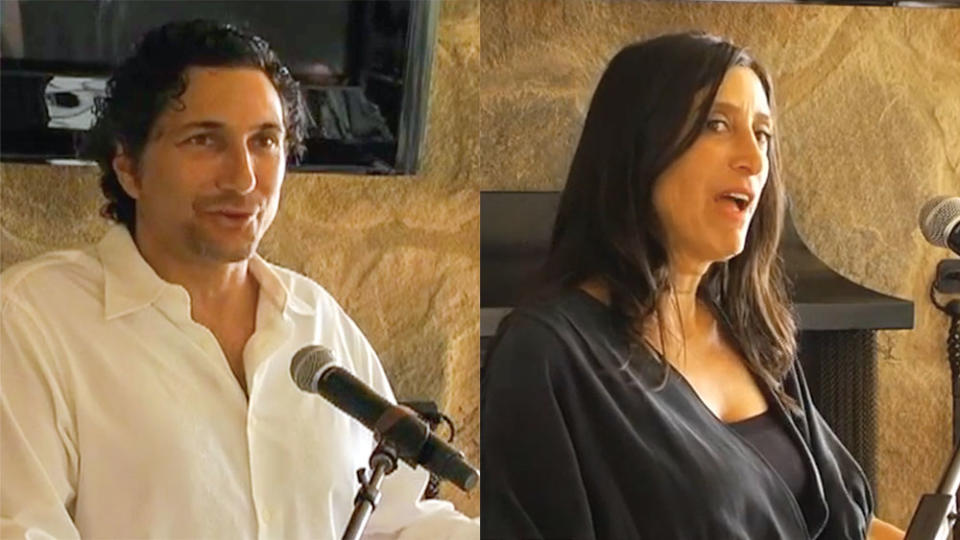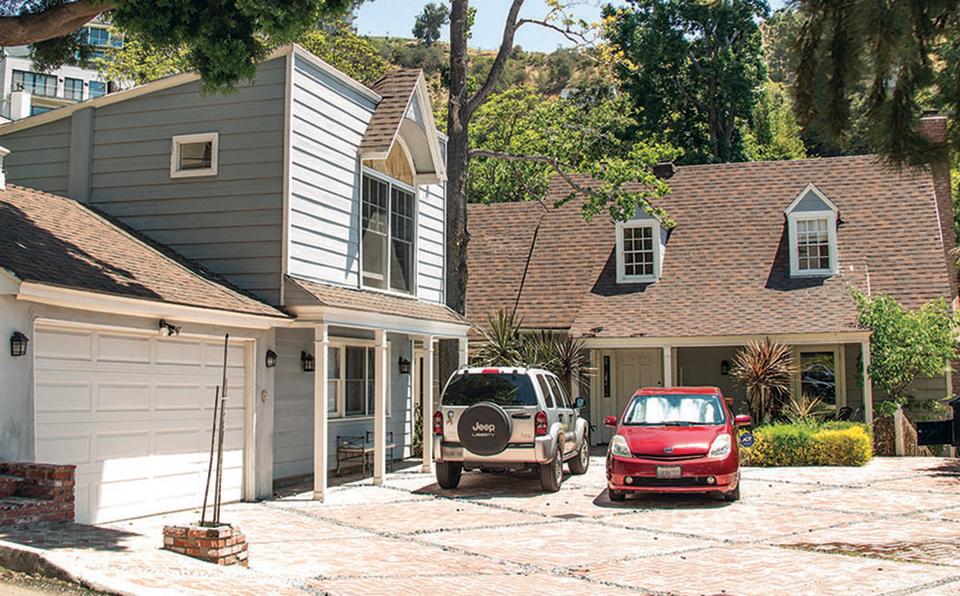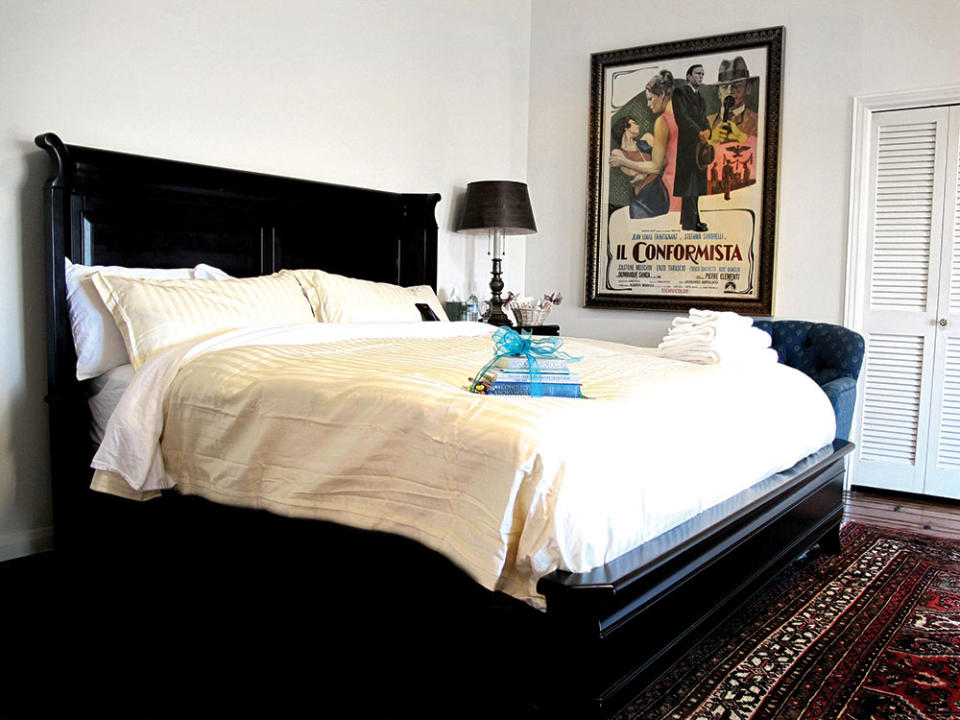Drugs, Death and Denial at a Rehab for the Rich

The film star, who had recently appeared in multiple blockbuster franchises, arrived in late 2019 at the Red Door, a high-end sober living home just off the Sunset Strip, to battle his heroin habit, according to several individuals close to him at the time.
The Red Door’s proprietor, a checkered figure in L.A.’s recovery community named Alex Shohet, was responsible for the actor’s care. He sought to bring his high-profile client in as a financial partner to expand the treatment facility. The plan, never realized, involved the purchase of Pauly Shore’s nearby multimillion-dollar residence, adjacent to the Comedy Store.
More from The Hollywood Reporter
'Rust' Rallied Hollywood, But Has Spurred Limited Action So Far
Post-Dramatic Stress: Ex-Students Decry Nightmare Acting Coach
Shohet, himself a recovering addict, operates under the philosophy that it is safer to keep addicts close, in the hope that they can be talked into better choices in time. But once there, the actor’s housemates introduced him to crack.
As the star’s addiction worsened in early 2020, Shohet became the client’s personal chaperone, known in the treatment field as a sober companion, which included responsibility for the star’s personal finances. In this capacity, Shohet fed substantial sums of money to the actor, which sources say he should have known would be used to purchase drugs — and were.
The experience of the star — who left the facility in March 2020, shortly after the onset of the COVID-19 pandemic — mirrors that of others who sought treatment at the Red Door, a go-to facility for troubled, deep-pocketed members of the Hollywood community and their children. The Red Door publicizes itself as providing “holistic, attachment-based, trauma-informed, individualized services to help people with trauma, substance abuse, and mental health issues.” The Hollywood Reporter spoke to more than two dozen people about the facility, including clients and their loved ones, staffers and other workers, who repeated many of the same criticisms of the facility.
Among their most damning allegations: that the sick too often aren’t getting well and clients have unnecessarily died as a result of lax care. Meanwhile, clients and their families have been financially preyed on at their most vulnerable. They believe that the facility’s failures aren’t just the Red Door’s own but highlight the lack of answers and protections in the sector at large, where desperation reigns and the nation’s mental health crisis and opioid epidemic rage on.
Shohet co-owns the Red Door along with another recovering addict, his therapist wife, Berni Fried. (Her long-standing celebrity-leaning Beverly Hills private practice’s clientele has included DJ AM and Scott Weiland, both deceased.) The couple declined to be interviewed for this story or to respond to detailed claims presented to them. Instead, in a statement, Shohet broadly cited soaring overdose statistics amid the ongoing pandemic (a reality) and noted that he was working with “our team” on unspecified “new technology” to combat the opioid scourge. “I, Alex Shohet, have been in the recovery industry since 2005 and my wife, Bernadine Fried, LMFT, has been working in the field since 1988. We have seen too many deaths from addiction and mental health disorders and each one is a tragic loss,” says the statement. It continues, “The Red Door staff and community stands with our fellow health care providers across the U.S. who are on the front lines fighting the overdose epidemic.”

Youtube
***
The couple previously operated One80 Center, a collection of residential treatment facilities in Beverly Hills and the Hollywood Hills that also catered to the rich, the famous and their adult offspring. The business shut down in 2013 shortly after THR published an investigation into allegations of substandard client care, including the circumstances surrounding two on-site overdose deaths. “All of [these allegations are] 180 degrees away from us as human beings,” Shohet told THR at the time. Added Fried: “We do really dedicated, thoughtful, compassionate work here. Anybody that knows us will tell you that.”
After One80’s closure, which followed a police probe and the filing of a wrongful-death lawsuit, Shohet turned to sober companionship gigs. (Prior to One80, Shohet worked as a computer systems engineer for MGM and Warner Bros. and headed the now-defunct box office tracking website ShowBIZ Data; he possesses no formal training in the recovery field.)
Meanwhile, Fried focused on her Beverly Hills practice, although her license was subsequently revoked by the California Board of Behavioral Sciences. She was placed on a four-year probation after then-state Attorney General Kamala Harris’ office alleged negligence, incompetence, failure to maintain confidentiality and to keep proper records, as well as intentional or reckless cause of emotional harm to a client. (Fried’s probation ended in April.)
In 2018, with the financial backing of a client’s wealthy family, Shohet and Fried opened the Red Door, renting a five-bedroom, Tudor-style home for their new business from Oscar-winning screenwriter Dustin Lance Black (Milk). Hidden from the street behind a high hedgerow and with a red front door, it featured a lush backyard and inviting pool. (One80’s properties also had a history of former famous inhabitants, including Elizabeth Taylor and Harry Houdini.)
Rates at the Red Door — which lures veterans of the high-end treatment circuit and their discouraged families with its promises of a maverick methodology — have varied over time. Clients have been quoted differing prices, but room costs have run as high as $15,000 per month. These sums are not inclusive of separate billable services, such as the assistance of a team of dedicated support staff, from case managers to sober companions.
Since the Red Door opened three years ago, two of its clients have died on-site under questionable circumstances, the second fatally overdosing at the couple’s newest rented treatment address, a Bel Air mansion that Ariana Grande’s mother, Joan Grande, called home until a few months earlier. According to insiders, when Fried has been asked if the couple feels responsible for fatalities at their facility, she’s pushed back, explaining that they’re battling difficult diseases and the stark truth is that some individuals will die while seeking help in supportive care environments — it’s just the nature of the treatment business.
The Red Door’s critics reject the notion of death-as-usual. “It’s a Jason thing,” insists Amber Fraley, who has worked as a sober companion for the Red Door’s clients, referencing the Friday the 13th franchise’s antagonist, who’s repeatedly resurrected in sequels, only to strike again. She’s among several frustrated whistleblowers who tell THR that two state regulatory agencies with oversight of addiction treatment have seemingly ignored their warnings. “They’re going to be the cause of more death. [Shohet and Fried] are able to be the vampires that they are because they’re in a broken system.”

Zillow
***
The Red Door’s niche in L.A.’s competitive premium-rehab realm isn’t luxury accommodations or individually tailored care plans. Those are givens. Instead, it’s a firm commitment to what the couple characterize as its harm-reduction approach to treatment.
Harm reduction, a catchall for various non-penalizing alternatives to abstinence (from supplying sterilized needles to providing safe harbor), has the immediate goal of limiting the risk of death or of contracting infectious diseases, such as HIV.
“I’ve worked with that same population: a lot of well-known and high-net-worth clients,” says addiction counselor Seven Graham, who helped establish the Amy Winehouse Foundation. Graham became familiar with the Red Door and its clients while attending a weekly recovery meeting that took place there. “[Harm reduction] is all about meeting them where they’re at, accepting that some people will come see you but they’re not ready to stop [using at that time]. It’s an incredibly high-risk strategy. If it goes wrong, it can go horribly wrong.”
The facility’s critics, including Graham, contend that harm reduction has served as a cover for institutional recklessness. One woman in her 20s, the daughter of a studio head, who was in residence at the Red Door between 2019 and 2020, says that “the sober companions weren’t there to keep you from doing drugs. They were there to keep you from dying. My sober companion drove me to my dealer. I was doing Xanax, cocaine, Oxy. The thinking was: ‘You’re going to do it anyway, so you’re safer with me’ — which, honestly, is true.”
Still, she believes that, ultimately, the Red Door isn’t virtuous but vulturous. “It’s an approach that preys on addicts,” she says. She claims that her family was charged for treatment services, including urine analysis, that weren’t performed. “When other people are allowed to use around you, that’s not an environment where you’re going to get better.”
This view is shared by another former client, Inger Lorre, who spent 11 months at the Red Door beginning in the summer of 2018 to address opiate addiction and depression. “I was very easily preyed on,” says the singer, who has fronted noted glam-punk band The Nymphs. “They’d say things like, ‘I’m going to leave a [urine] test here,’ and walk away. You’re supposed to have people watching you do the tests.” She adds, “I think [Shohet] thinks, ‘These people are going to get drugs and get loaded anyway, and I might as well get their money.’ ”

Chris Godley
***
Dating to his ownership of One80, Shohet has pitched his clients — and, more often, their wealthy family members — to invest or otherwise partner in his work while they’re still under his care. Shohet, who hosts a weekly meeting for entrepreneurs in recovery at the Red Door and has a history of hiring individuals who have achieved even relatively brief stints of sobriety to work for him, positions the prospective partnerships as providing opportunities for recovering addicts who might typically struggle to secure employment, a key component in stabilizing their lives.
Critics also cite a conflict in Fried’s referral of her private-practice clients to the facilities she owns with her husband. One of her former therapy clients (an inheritor of one of the world’s richest fortunes), who stayed at One80, alleged in a complaint filed with the California Board of Behavioral Sciences that Fried had disclosed her private secrets to Shohet, who’d been working to convince both the scion and her similarly moneyed sister to invest in his commercial endeavors.
At the Red Door, these attempts to garner financial backers have found success. Insiders say a residence on Fairfax Avenue was bankrolled by the parents of one addict who in turn was treated there. (This was a situation that staffers involved in her care say was to her detriment, because she was indulged in a manner that made it more difficult to engage in the challenging work of recovery.)
Some found such solicitation inappropriate. “[Shohet] took advantage any way he could,” says Lorre’s mother, Lois Wening, who notes that an elderly relative with known means, who has since died, was hit up for investment. “He got himself involved in our whole family. He came into our lives when we were, quite frankly, struggling and upset, and unable to look for other [treatment] solutions. He preyed on our vulnerability.”
Meanwhile, in the past two years, Fried has ventured into hallucinogenic-assisted psychotherapy, hosting excursions to desert locales. According to the Red Door’s staffers, she’s invited her own clients to take MDMA, mushrooms or ayahuasca under her guidance. Her business partner for these excursions is a case manager employed at the Red Door named Bianca Fisher.
On Fried’s private-practice website, she describes both herself and Fisher as trauma and addiction experts with specializations in “integration of plant medicine, ketamine, MDMA, and psychedelic medicine.” In an email, Board of Behavioral Sciences spokeswoman Cheri Gyuro, who did not comment specifically on Fried, notes that licensees “do not have prescribing or administering authority,” and that it “is unprofessional conduct for a marriage and family therapist to use or offer drugs in the course of performing marriage and family therapy services (unless they are licensed to do so under another board — for example, the Medical Board of California). A professional should not perform services outside their scope and should make referrals to specialists who have that expertise.” Fried did not address questions regarding her licensing; Fisher did not respond to requests for comment.
***
The 20-year-old daughter of an East Coast venture capitalist died on June 28, 2020, in the back house of the Red Door, having fatally overdosed on a combination of cocaine, OxyContin and Xanax. She’d arrived two months earlier, seeking treatment for depression, not addiction.
According to those close to the situation, she died after spending the night with another drug-abusing housemate, a Billboard-charting music producer with whom she’d been intimately involved. While the coroner’s report raised the possibility of suicide, insiders don’t believe she meant to kill herself — among the evidence, they cite the lack of a suicide note and her recent acquisition of pet bunnies. However, in her unsafe state she’d been allowed to become too close the producer who, one insider says, “was out of control.”
At the time of her death, multiple sources say she’d been in discussions with Shohet about approaching her father to finance an additional property for the Red Door, where she planned to stay with the music producer.
The Red Door’s second death occurred Jan. 4, 2021, shortly after it relocated to a new, larger, contemporary-style residence in Bel Air along Mulholland Drive with sweeping views of the San Fernando Valley. William Cooney — a 36-year-old father to a young boy — was found unresponsive and lying on the floor of his bathroom by fellow residents. Attempts to resuscitate him were unsuccessful.
According to the coroner, he overdosed on fentanyl and meth. Insiders note that he got the fentanyl from another housemate. His toxicology exam also showed cocaine in his system, still circulating from days earlier. Insiders who have seen the report say that, taking these factors together, they believe the Red Door didn’t test or monitor its client closely enough.
Amara Durham, a substance abuse consultant who Cooney’s family had previously retained to work with William, notes that he checked in to the Red Door against her advice: Durham was concerned about the facility’s licensing status and the couple’s publicized track record. But he ignored her advice, persuaded by his girlfriend. (THR separately learned the actress had once been a client at One80.)

Courtesy of Subject
After Cooney’s death, Durham conducted a probe at his family’s request, interviewing the facility’s employees. She says she found that some staffers themselves had less than a year’s sobriety, weren’t properly trained in first aid, lent their phones to clients who in turned used them to contact active addicts, and failed to administer consistent drug tests or conduct room searches — even when residents appeared to be under the influence.
The tenure of Jordan Brodie, a musician with no training in the treatment field, spanned from November 2019 to October 2020, including as house manager, and overlapped with that of the daughter of the venture capitalist who died. He says: “Not only are the clients being taken advantage of, but staff members are, too. [Shohet] hired me but didn’t train me — in basic things, like administering Narcan [an emergency antidote to opioid overdoses]. He put me in a position where I wasn’t equipped to handle what I was doing, which was overseeing highly vulnerable people. In fact, on the second day, there was an overdose. I had to get a client to administer the Narcan because I was not trained.” (Durham found that a housemate administered Narcan to Cooney after he overdosed, and that staff said the facility was not trained to handle overdoses by residents nor were any written procedures ever provided to them.)
Brodie adds, “I noticed a lot of unethical things, and every time I would point them out, I would get shut down.”
Says Durham, “The Red Door promotes itself as a steward of very vulnerable people. At the very least they had a reckless attitude about this responsibility.” Cooney’s family is unsparing. “We knew that overdose was possible; we never imagined it would happen in a rehab facility,” says his father, Gary Cooney, vice chair of national insurance brokerage firm McGriff, Seibels & Williams.
Adds William’s ex-wife, Sarah Morse Cooney: “This should not have happened. If this facility had the appropriate structures in place, this could have been avoided and my son would still have his father, and I my friend. I hope the individuals that were complicit in his mismanaged treatment are held accountable and never risk preying on another vulnerable addict.”

Courtesy of Subject
***
Residential treatment programs licensed by California’s Department of Health Care Services are required to report the death of any client from any cause within one working day. Yet because the Red Door’s only certification with DHCS has been as an outpatient program (not a 24-hour residential treatment facility), registered to Fried’s Beverly Hills private practice address, DHCS was unaware of the fatalities.
According to DHCS, the Red Door submitted its application to be a licensed residential program at the property rented from screenwriter Black in September 2020, months after the woman’s deadly overdose; it’s still pending. DHCS has yet to receive an application for its Mulholland Drive location.
Staffers and clients who’ve worked at the Red Door’s residential addresses say both sites have operated beyond DHCS’ prescribed bounds for sober living homes, which don’t require licenses. (Durham notes that the Red Door, presenting itself to the family as a treatment environment, administered potentially addictive medications to Cooney on-site, including benzodiazepines, often prescribed short-term for anxiety and insomnia.) Agency spokeswoman Carol Sloan notes that it’s a violation of California regulations to provide drug recovery or treatment services in an unlicensed setting. “Until DHCS approves and issues a license, those services cannot be rendered” at a residential facility, she explains. When asked about administering medication on-site, the Red Door spokesperson says, “The Red Door is not a treatment center. It is a sober living facility.”
The Red Door’s critics find the regulatory oversight — or lack thereof — frustrating. Shohet and Fried’s history at One80 (previously licensed with the agency) wasn’t reviewed as part of even its outpatient certification process. Additionally, Fried’s then-probationary status as a therapist didn’t derail her from being allowed to serve as its clinical care director.
“The issue at the heart of this isn’t Berni and Alex; they are grifters and always have been since he was a drug dealer and she was his client,” says Suzanne Wallach, a marriage and family therapist specializing in dual-diagnosis addicts, who performed intern work under Fried at One80 and subsequently filed whistleblowing complaints to both DHCS and the Board of Behavioral Sciences in 2012. “What is most shocking is that the regulatory agencies that are in place to keep the consumer safe have done nothing over the past 10 years. These agencies, which are supposed to hold clinicians and treatment providers to high standards in order to keep patients safe, have miserably failed. How many people have to die before these people are stopped?”
Brian Dunphey, another marriage and family therapist specializing in addiction work, filed his own whistleblowing complaint with DHCS in September. He’d grown concerned after brief discussions about a high-level role at the Red Door, which included an on-site visit.
Dunphey contends the agency didn’t appear interested in pursuing the matter in the months before the second death. “[DHCS] does not move a finger when peers in the community raise alarm,” he says. “There has to be more of a concern when people are dying.” He adds, “When problems are brought up by someone with credentials, [the agency] doesn’t do anything about it. So there’s no way that a consumer or their family, who are distressed, are going to know. For them there’s no time to do extensive research.”
***
Those speaking against the Red Door are united in their judgment of its deficiencies. They come to different conclusions as to apportioning blame, from ineffective regulatory oversight to some mix of Shohet and Fried’s ego, greed, delusion and even misplaced good intentions. What they generally agree on is that the couple’s strong belief in indulging their customers, which serves in part as a market distinguisher within their ultra-high-end servicing niche, is corrupting.
“Alex and Berni pander, and the people going to a place like this need boundaries,” says Graham. “They hold up this model that isn’t really treatment. It’s babying. Addicts want to find a way to not get clean. Alex and Berni have created a program that allows them to do that.”
This story first appeared in the July 21 issue of The Hollywood Reporter magazine. Click here to subscribe.

